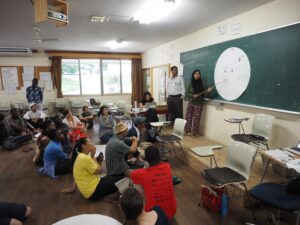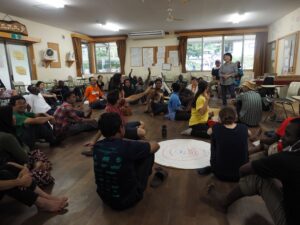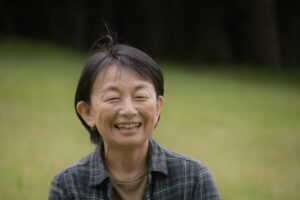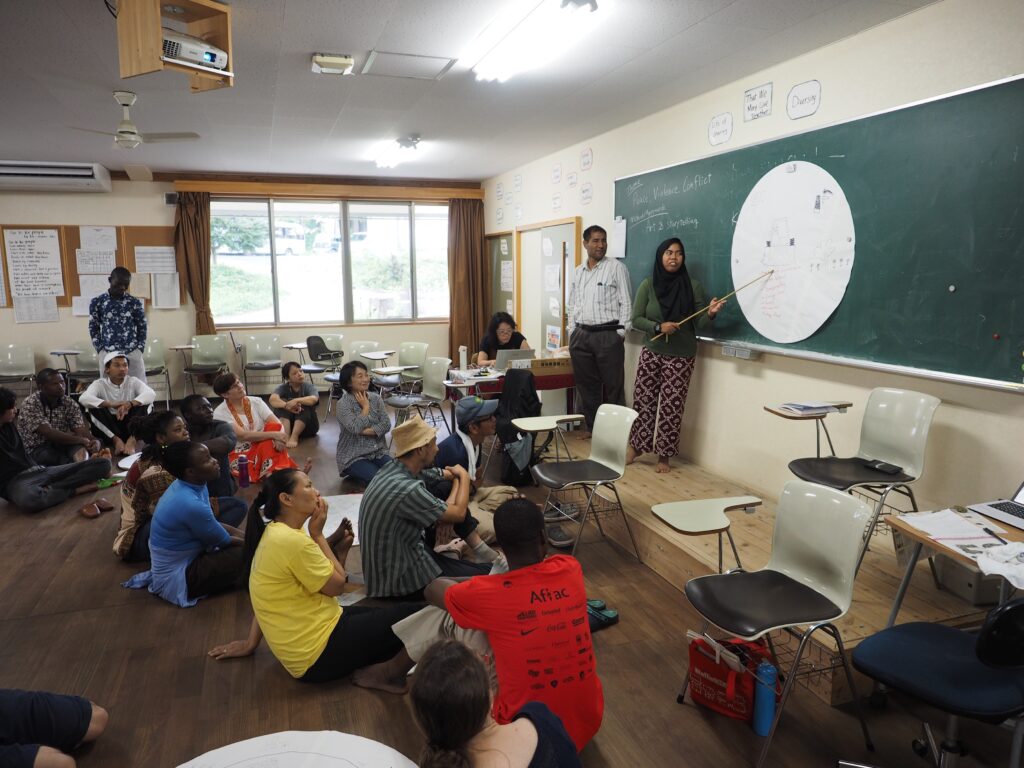A Roleplay for Dignity
Jeffrey Mensendiek serves with J.F. Oberlin University in Tokyo, Japan.
For the past three years, I have been working with the Asian Rural Institute (ARI) in dignity education.

ARI is a partner school of Global Ministries that brings together rural leaders from Asia, Africa, and the South Pacific for a nine-month leadership training program. The participants who come from various cultural and religious backgrounds share a common life together, working the land and harvesting their own crops. What follows is a roleplay based on the story of the director of ARI, Tomoko Arakawa. Roleplays are useful to help leaders see what it looks like to honor and protect dignity.
Narrator: It was the summer of 2019. Tomoko had just completed several work-related trips overseas and had also lost her father in August. She knew that most of her time and energy had been consumed with issues outside of her small learning community. She felt out of touch with the participants who had gathered in April from various countries in Africa, Asia, and the South Pacific. Tomoko wanted to feel the pulse of the community again, so she decided to do something new.

Tomoko: Attention all participants (a name used to refer to the students at ARI). Tomorrow afternoon we are scheduled for my class. Instead of giving my lecture, I’d like each of you to think of one question that you want to ask me. I feel I haven’t been able to really sit down with you to face some of the issues that are on your mind. Our time is limited so I ask that you prepare your questions in advance. Think of your choice question for me. I intend to give you my full attention and answer as best I can. Do you like this plan? Are you interested?
Participants: Yes. We like this plan very much!
Narrator: The participants were surprised and thrilled by this sudden opportunity to address the head of the institution with a question. The conversation at the dinner table that evening was all about the questions they were going to ask the next day.
Participant 1: Have you decided what you’re going to ask Tomoko-san tomorrow? I’ve got so many things I want to ask her that it’s hard to decide.
Participant 2: My question might be a bit too direct, but it’s been on my mind for some time now and this is just the chance I needed.
Participant 3: I’m interested in leadership, so I want to ask her as the head of this school what her thoughts are on leadership.

Narrator: The following day all participants were sitting in the classroom with Tomoko. Tomoko was a bit nervous because she had never done something like this before. But she was prepared to face their questions and knew that if she was honest with them and wasn’t evasive, this would help build bonds of trust with the participants.
Tomoko: Shall we begin? Who wants to go first?
Participant 1: I will start. As the director of ARI, I believe it is important for you to be open to hearing the concerns of the community. What do you do to make sure that you are hearing our concerns?
Tomoko: In our daily life together, I try to call on people and start casual conversations so that people feel that I am approachable and easy to talk to.
Participant 1: Even so, I think there are deeper concerns that don’t necessarily come to the surface. Do you do anything special to gather those concerns?
Tomoko: I try to gather information by talking with the staff. How about you? Do you have a suggestion for how to gather the concerns of the community?
Participant 1: You could establish a suggestion box. Even if you present yourself as an approachable person, I’m sure there are people who would not feel comfortable expressing a concern directly to the director. If there was a way to make a suggestion in an anonymous way that would be very helpful.
Tomoko: Thank you for that suggestion. I will be sure to do that.
Participant 1: Establishing the suggestion box is not enough though. You must make sure to check on it periodically and be responsible as head of the institution to follow through.
Tomoko: Yes, you are right. I will be sure to follow through. OK, may I have the next question?
Participant 2: (A male pastor from Africa with a walking impairment) OK. My question has to do with how ARI deals with people who have disabilities. My question is direct. Does ARI really want to accept people with disabilities? If so, what is your reason, and what is the implication for ARI?
Tomoko: My feeling is that if a person has the will to study at ARI it doesn’t matter whether that person has a physical disability or not. The motto of ARI is “That we may live together.” This means not only that we learn to respect religious and cultural differences, but also that we find ways to live together with people with disabilities. However, as you know this school involves a lot of farm work. Depending on one’s physical ability, there may be portions of our training that that person may not be able to participate in. In that case, we would need to be in communication beforehand to make sure that that person understands our situation.
Participant 2: As you know, I have a walking impairment. I have felt the support of many people, and I know that ARI has made many adjustments for me, for which I am grateful. However, the fact that the men’s dormitory is at the top of a steep hill, or the fact that gravel has been spread on the grounds near the main building makes it hard for me to walk. From my perspective, there are many things that need to be considered if ARI is going to be welcoming toward people with disabilities. Are you prepared to make those changes?
Tomoko: I was not aware that you were facing so many inconveniences here at ARI. I want to apologize for that. I’m afraid there are many more concerns that you will need to point out to us. Even though our facilities may be insufficient today, I hope we can make small improvements each year, and your input will be a great help to making our community more welcoming to people with disabilities.
Participant 3: (a woman from the Philippines) I heard that you are the second woman to be director of ARI. As a woman in a leadership position, what do you think is most important for your leadership?
Tomoko: First of all, I have never thought that my gender dictates my leadership. On the other hand, there have been women participants who have told me how encouraged they were to see me in a leadership position. I was happy to hear them say that they were inspired by me. I need to be mindful of the fact that people are watching me, so I need to set a good example. When the search committee first asked me to be the director of ARI I refused because I compared myself to former directors and didn’t think myself worthy of the task. However, they assured me that they felt I had the qualities to lead the organization. I was so glad to receive that kind of personal acknowledgment. That has inspired me all the more to do my best for ARI.
Participant 3: Have you faced any difficulties because you are a woman?
Tomoko: The staff has been very supportive, so I haven’t faced any major issues regarding gender. But many of you participants have a lot of experience in your home countries, so maybe you have felt at times that I was not as reliable a leader as I should be. When I first became a director, I always felt inadequate. However, through the years you have taught me so much, and I believe I have grown into my role as director. These days I feel that it is important to be honest about my vulnerabilities and inadequacies so that we can all help each other to grow.
Narrator: The session continued for two and a half hours as each of the 23 participants asked their questions. The participants listened intently, identifying with each other’s questions, and sharing moments of laughter and surprise. Following the session, Tomoko felt tired in a way that she had never felt before. And yet she also felt refreshed and satisfied as if the air had been cleared. Following the session, Tomoko felt a stronger sense of connection to the participants. Some participants came up to her with kind words of empathy, saying, “Thank you for doing that. I’m sure it wasn’t easy. It must have taken a lot out of you.” Many of the participants knew firsthand the challenges and rewards of leading with dignity.
Jeffrey Mensendiek serves with J.F. Oberlin University in Tokyo, Japan. His appointment is made possible by your gifts to Disciples Mission Fund, Our Church’s Wider Mission, and your special gifts.

